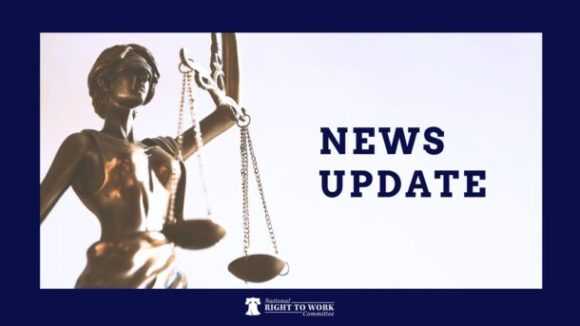Committee Tells Politicians: Stop Waffling
Members Insist They Keep Pro-Right to Work Campaign Promises
 National Right to Work Legal Defense Foundation attorneys lead by W. James Young fought to stop SEIU abuses of Dianne Knox and her fellow employees right not to be compelled to “subsidize a [SEIU] political effort designed to restrict their own rights.” The U.S. Supreme Court 7-2 Opinion written by Justice Alito sets back another Big Labor easy political money scheme right before the 2012 elections. This decision should lead to new challenges to Big Labor’s compulsory actions in the future.
National Right to Work Legal Defense Foundation attorneys lead by W. James Young fought to stop SEIU abuses of Dianne Knox and her fellow employees right not to be compelled to “subsidize a [SEIU] political effort designed to restrict their own rights.” The U.S. Supreme Court 7-2 Opinion written by Justice Alito sets back another Big Labor easy political money scheme right before the 2012 elections. This decision should lead to new challenges to Big Labor’s compulsory actions in the future.
Two of the Justices, Breyer and Kagan, who opposed the right of individuals to voluntarily spend their own money on politics in the Citizen United case, both supported the notation that unions could compel people to unwillingly support politics that they oppose.
From the Opinion:
…. When a State establishes an “agency shop” that ex- acts compulsory union fees as a condition of public employment, “[t]he dissenting employee is forced to support financially an organization with whose principles and demands he may disagree.” Ellis, 466 U. S., at 455. Because a public-sector union takes many positions during collective bargaining that have powerful political and civic consequences, see Tr. of Oral Arg. 48–49, the compulsory fees constitute a form of compelled speech and association that imposes a “significant impingement on First Amendment rights.” Ellis, supra, at 455. Our cases to date have tolerated this “impingement,” and we do not revisit today whether the Court’s former cases have given adequate recognition to the critical First Amendment rights at stake. …
Acceptance of the free-rider argument as a justification for compelling nonmembers to pay a portion of union dues represents something of an anomaly—one that we have found to be justified by the interest in furthering “labor peace.” Hudson, 475 U. S., at 303. But it is an anomaly nevertheless.
Similarly, requiring objecting nonmembers to opt out of paying the nonchargeable portion of union dues—as opposed to exempting them from making such payments unless they opt in—represents a remarkable boon for unions. Courts “do not presume acquiescence in the loss of fundamental rights.” …
Thus, the effect of the SEIU’s procedure was to force many nonmembers to subsidize a political effort designed to restrict their own rights. ..
From the SCOTUSblog.com:
Knox v. Service Employees Int’l Union, Local 1000
Docket No. Op. Below Argument Opinion Vote Author Term 10-1121 9th Cir. Jan 10, 2012Tr.Aud. Jun 21, 2012 7-2 Alito OT 2011
Holding: The case is not moot, and the First Amendment does not permit a public-sector union to impose a special assessment without the affirmative consent of a member upon whom it is imposed.
Judgment: Reversed and remanded, 7-2, in an opinion by Justice Alito on June 21, 2012. Justice Sotomayor filed an opinion concurring in the judgment, in which Justice Ginsburg joined. Justice Breyer filed a dissenting opinion, which was joined by Justice Kagan.
SCOTUSblog Coverage
- Argument recap: Mootness could squelch union fees case
- When union fees go up, must a “Hudson notice” go out?
- Granted case challenged as “moot”
Briefs and Documents
Merits Briefs for Petitioners

Members Insist They Keep Pro-Right to Work Campaign Promises

The Foundation’s brief before the High Court in Starbucks v. McKinney discusses how NLRB officials use this radical assumption to urge federal courts to hit employers with “10(j) injunctions” that coerce the employers to give into certain union-demanded behavior.

Security guard James Reamsma is disappointed that the Right to Work repeal re-imposes forced-dues payments, but he and his coworkers still have a shot to restore their liberty.